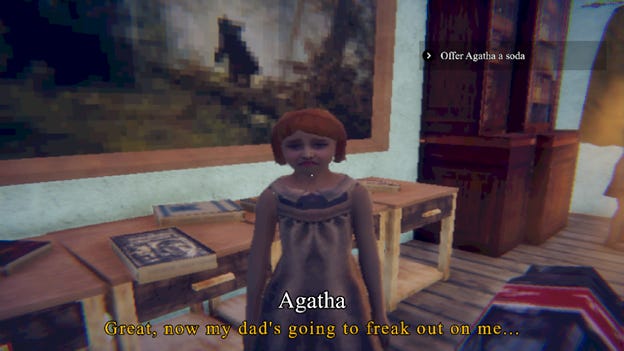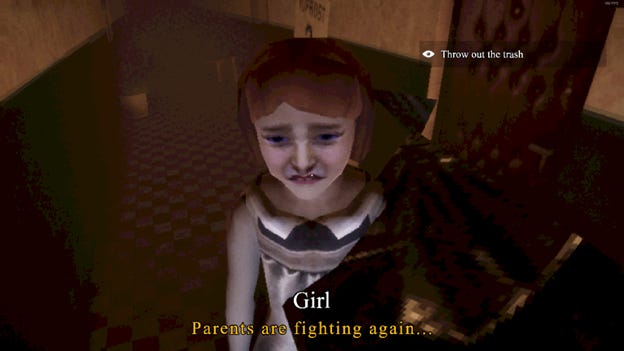It's The "Bober Bros!"
Developing games with an admirable purpose.
Exploring the indie landscape of video games has been a fun and rewarding experience. My appreciation of narrative has grown since I began my academic studies, so finding a community that thrives on different approaches to a story and mechanics has always been fun.
I’ve realized that indie games are more likely to tackle serious themes, topics, and narratives, as the developers are usually more concerned with the message than commercial profits. There is a fear that talking about certain things can cause a backlash, and unwarranted harsh critiques, and make it a probable failure because of the topics touched on.
Many themes have been explored in literature, dark, taboo, and often common occurrences that aren’t spoken about in the publication because of their severity. This is when we get into the banned books ordeal, sometimes because of their blunt depiction of discrimination, sexual assault, and other horrors of reality.
But the Bober Bros. are making Interslavic horror games that aren’t the traditional horror games we are accustomed to seeing. I’m not talking about normal psychological horror, either. Their mission is to create a space that allows people to see the true horrors of child abuse through games they develop, allowing people to empathize, while also allowing people who have been through these situations to understand they’re not alone.
The developers are friendly and open enough to the fans that anyone can go into their Discord and ask them questions in the “ask devs” section, so I asked away.
I'll be writing a post about you guys on my small blog, and I was wondering why create games around these themes, as I've noticed all these games are surrounded by the same theme of child abuse. I know that books have explored these themes for years, which is why I like realism and contemporary fiction, because of their grounded feel, but I just realized that I haven't seen these explored in this medium. I do understand that it's based on real-life experiences, just wanted to know if there were any reluctances, doubts, or motivators.
IndiePunk’s answer: We don't limit ourselves when it comes to the ideas and realization of our games. When we released the game, we were concerned that it might be canceled because of the game's concept. But we decided that if our horror games are to be as violent as reality, we will go ahead with it.
Mnim’s answer: Hi! Thank you so much for playing and for your kind words—it means a lot to us!
To answer your question, I grew up in an abusive family, and many of my friends did too. Growing up, we didn’t talk about it much, and a lot of us didn’t even realize how wrong and unacceptable it was until we were adults. Video games were always my escape, and now that I make them, it feels natural to use this medium to explore and bring awareness to these themes.
Our goal is to tell stories that show people living through abuse that it’s not normal, it’s not okay, and that there’s a way to find happiness after it. We’ve also noticed that people who’ve experienced abuse often connect with darker, more introspective stories, so we try to meet them there—with our message, our experiences, and hopefully some understanding.
That’s kind of the heart of why we do what we do. Thanks again for the support—it really means the world to us! Can't wait to hear what you think of Happy House!
Has there actually been negative feedback? I would be surprised if so, seeing that, at least for me, the games come off as genuine and not of shock value. Glad you guys went ahead, though.
IndiePunk’s answer: We were just afraid that the topic of SA might be taken badly, but we decided to make a game about it anyway. But in the end we see a positive reaction, and that gives us the strength to make even more brave and cool games that will make people cry and laugh
As I go over these games, I will only give a summary and my view on them, as piecing the scenes together through context, and sometimes just paying attention, is something that needs to be experienced to thoroughly get the message.
It’s Just A Prank
Price: $2.99
You play Filip, a young boy with a mischievous and troublesome close friend named Johan. Oh, he’s the troublemaker alright. Whoopie cushions, convincing you to throw balls at paper at the teacher, and more shenanigans that would make your parents force you to end your friendship with him.
But one joke might’ve gone a bit too far, as Johan puts the blame on Agatha, a shy classmate. Her father’s very aggressive, and very unpredictable. But it was all a joke, just a prank.
Their debut game shows that they were still figuring out how they wanted to do it, but that they had an idea. The pacing feels rushed, the characters go from 0 to 100, and it doesn’t make much sense. But, you can see that the setting is well established, and some anger is given some context, but others are kind of left field.
It does follow the whole “the boy who cried wolf” trope, but it does it without much buildup, bringing up some things you’d think would be narratively significant, but end up either flat or nowhere.
Stories this short are harder to do, as you are trying to cram so much into such a small space of time, but the foundation of what they want to do is there, and it can be seen in their next game that they learned a lot.
The Hole
Price: $2.99
In The Hole, you play as a man who has a troublesome neighbor. You can’t tell what’s happening next door, except that the air is filled with screaming and yelling. Every day you wake up, you continue your routine, regardless of what’s happening next door.
Wake up, drink a can of beer, eat your cereal after microwaving it, take out the trash, then sit down and watch TV. But hearing all the yelping, and the crying, you confront the unfriendly neighbor, not because it’s wrong what he’s doing, but because you’re tired of it.
After he tells you to fuck off, you go back to your room, to continue your routine. But there’s a hole in the wall now. Now you can see into your neighbor’s room. What’s on the other side?
It feels like with The Hole, The Bober Bros got their footing in pacing, narrative, and gameplay, as it’s an improvement in every aspect from It’s Just A Prank, even bringing characters from that game to The Hole. They committed to the harsh reality of abuse but did it in a jarring and engaging way. The protagonist's attitude is much like the father’s, and in fact, who are you playing in this game?
The imagery and metaphors used in this game are clear enough to paint a horrible picture of what’s happening, conveying the exact message you wish it weren’t delivering.
The story's pacing gives you enough space to stomach what’s going on, mixing a little bit with the mundane that happens daily, while either feigning ignorance or ignoring the atrocities of what’s happening. It also shows how people who perpetuate such violence are not only dangerous to their families but anyone around them.
I won’t go deeper into the story, as it’s an impactful and well-written story/game, just know that if you give this game a try, it gets very real in many points.
The Bober Bros. mission is an admirable one that I don’t see often in gaming narrative. The imagery and metaphors are effective, engaging, and I can’t wait to see what they do with their upcoming game Happy House, which tells the story of a mother who seems to be perfect in front of everyone, but a monster behind closed doors. I’ve met people that have gone through that specific problem, and seeing that they did such a wonderful job with The Hole, I’m excited to see their execution for this one.
If you want to support them, be sure to check out their games, or their Patreon.
What do you think about their purpose? Will you be checking these games out? Have you played other games with serious themes being the focus? Do you think it’s appropriate for this medium? Let me know below!









